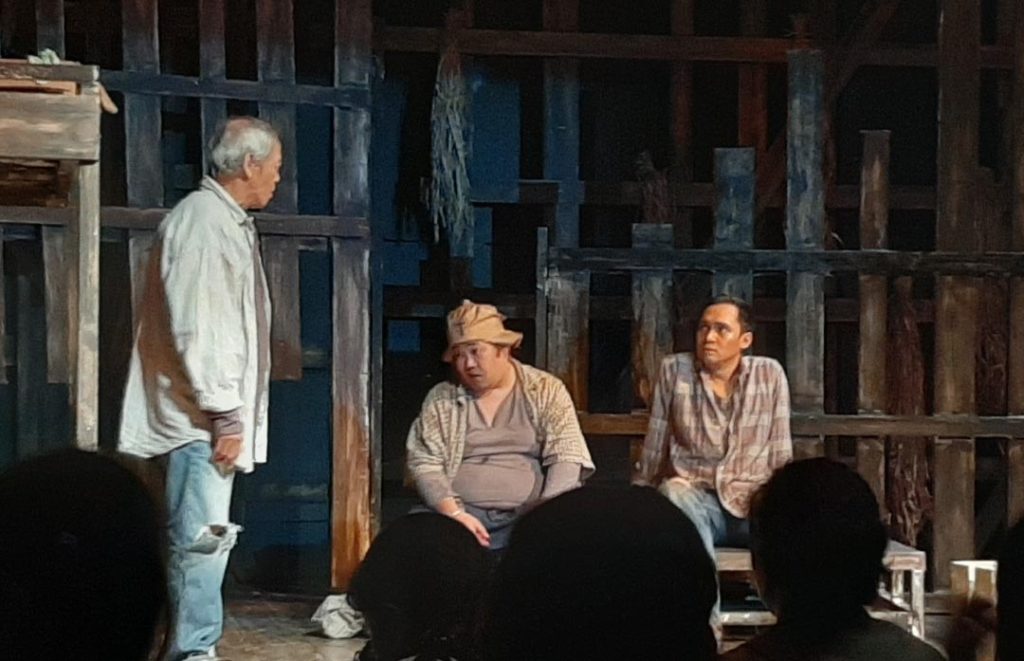By MARLON LESTER
Bulatlat.com
Tanghalang Pilipino’s “Katsuri” is a riveting reminder of the power of dreams and of camaraderie, at the same time an admonition against the absence of such.
An adaptation of John Steinbeck’s “Of Mice and Men,” the script was written by Bibeth Orteza and directed by Carlos Siguion-Reyna. Daring enough to tackle the grim conditions of Filipino farmers, the production deserves attention and support especially this October, the Peasant Month.
Katsuri, Hiligaynon word for shrew, centers on two sakadas’ pursuit of a shared dream. One smart and reserved, the other dimwitted and innocent but crazy strong. Together they face the harsh realities of feudal relations, between sakadas and haciendero, young and old, men and women, varying ethnic groups, and strong and weak.
Situated in Negros, Katsuri becomes an adaptation too of the Negros people’s story of age-old feudalism and militarization. Today, the island is under an undeclared military rule. Progressives, from grassroots organizers to journalists and councilors, are killed, arbitrarily arrested, and threatened. The production itself is in honor of Bernardito “Toto” Patigas, councilor of Escalante City and activist-campaigner for Bayan Muna who was gunned down by suspected state agents on April 22 this year. In his memory, Orteza renames Steinbeck’s “Lennie” to “Toto.”
Katsuri’s crisp characters depict varying attitudes sakadas have towards the dream of tilling their very own land, and the complexities of hacienda life.
The mentally ill Toto (Jonathan Tadioan) represents the innocent, unadulterated will of his fellow sakadas. Crucially, Tadioan’s antics consistently liven up the otherwise dark subject matter. Albeit naive, his powerful dreaming draws the support of and gives hope to the smart but reserved George (Marco Viaña), the depressed old Tatang (Nanding Jose), and the cynical black Nognog (Ybes Bagadiong). Able, wise, and self-content, Payat (JV Ibesate) sees no need in dreaming further; still he respects those who do. Although mentally well, all of them share Toto’s disability to understand and decisively face the socio-political forces dominating over them.
We see in Inday (Antonette Go) a glimpse of the intense oppression poor rural women suffer. While Orteza wrote a more nuanced version (she’s not even named in Steinbeck), she’s still almost never treated as human. Her scenes provide intrigue and tension. Carling (Lhorvie Nuevo), male in the original, offers a strong female character in contrast. Haciendero son Kulot (Fitz Besana), on the other hand, is an overcompensating emasculated male.
The addition of soldiers creeping around and randomly shooting peasants in between scenes is an evocative depiction of rural militarization. The audience too anticipated, feared the sound of gunshots.
The very last scene is a creative unmasking of the invisible yet most powerful force dominating over all the characters – Boss (Michael Williams), the haciendero. The feudal bondage itself is revealed as the ultimate hurdle to the sakadas’ dreams.
In the end, George seemingly begins the path towards despair, cynicism, or defeated acceptance as the only paths available in Steinbeck. The audience however is left to reflect; contrasting these options with Toto’s seemingly irrational yet definitely tight grip of that simple dream, and our reality.
The story of sakadas dreaming particularly resonate in the context of rural Philippines. Filipino farmers articulating and asserting their dreams and aspirations are often left unheard or even silenced by those in power. Such is the case of the more than 230 farmers already killed under the Duterte administration.
What our farmers have, however, which George and Toto lack, is organization. In this context, people’s organizations can be seen as the crystalization of the poor’s collective dreams and their means to tighten camaraderie and unity. In organizations, the common dreams of mere katsuris become achievable plans and differing abilities and disabilities become tools in surmounting challenges. Toto’s character may be daring us to dream and dream strongly, but reality off-stage compels sakadas, and us too, to get organized.
Tanghalang Pilipino’s Katsuri runs from October 4 – 27 at CPP’s Tanghalang Batute.
For ticket reservations, group sales, and special performances please contact Tanghalang Pilipino: 0999 884 821, 0915 607 2275, or (02) 832 1125, local 1621.
Tickets are also available at the CCP Box Office, Ticket2me, Bliimo, and all TicketWorld outlets. For more information, visit the TP Facebook page at http://facebook.com/tanghalangpilipino or e-mail tanghalangpilipinomarketing@gmail.com.
DISCLOSURE: Bulatlat is one of the media partners of Tanghalang Pilipino’s 33rd Season.
The post Katsuri: Sharing the sakadas’ dream appeared first on Bulatlat.


